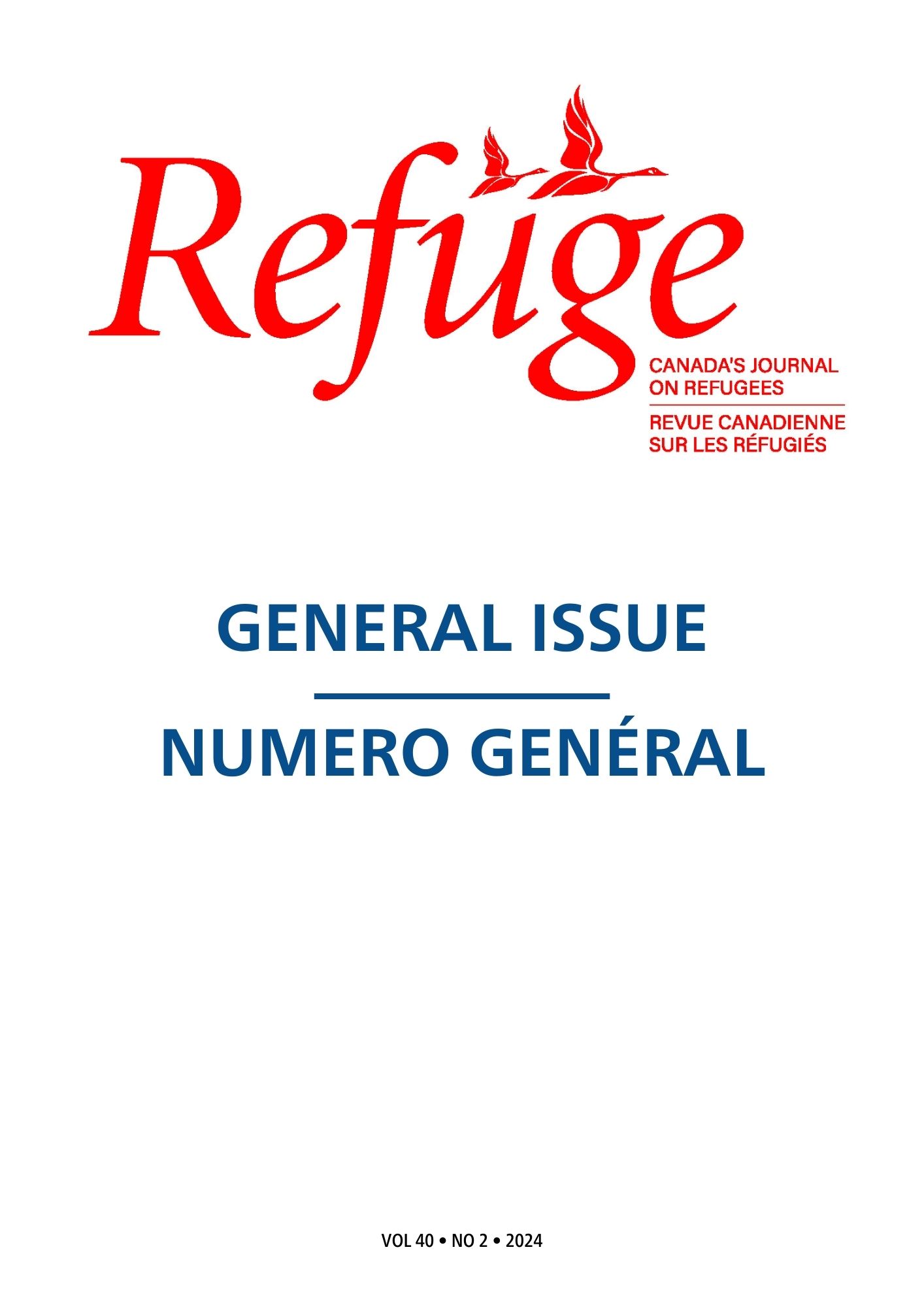Threats, Victims, and Survivors: The Racialized Gendering of Syrian Refugees and Literary Contestations of Dominant Media Narratives
DOI :
https://doi.org/10.25071/1920-7336.41371Mots-clés :
refugee, literature, agency, racialization, gender, representationRésumé
Les récits des médias occidentaux sur les réfugiés syriens dépeignent souvent les hommes comme des menaces et les femmes comme des victimes sans défense, à travers des constructions racialisées et genrées. La littérature contemporaine de la diaspora syrienne peut contrer ces représentations médiatiques problématiques et dominantes. Plus précisément, L’Apiculteur d’Alep de Christy Lefteri et A Land of Permanent Goodbyes d’Atia Abawi offrent aux lecteurs la possibilité de ressentir de l’empathie en contestant les représentations racialisées des hommes réfugiés syriens comme des menaces, en décrivant de manière positive des protagonistes masculins complexes, en révélant leurs vulnérabilités et en mettant l’accent sur l’attention qu’ils portent à leur famille, et en particulier aux femmes qui en font partie. Ces oeuvres reconnaissent les attentes culturelles patriarcales à l’égard des Syriens et réaffirment l’agentivité et le pouvoir des voix des femmes réfugiées en montrant leurs effets sur l’empathie d’autrui.
Statistiques
Références
Abawi, A. (2018). A Land of Permanent Goodbyes. Penguin Random House LLC.
Arcimaviciene, L., & Baglama, S. H. (2018). Migration, Metaphor and Myth in Media Representations: The Ideological Dichotomy of “Them” and “Us.” SAGE Open, 2. https://doi.org/10.1177/2158244018768657 DOI: https://doi.org/10.1177/2158244018768657
Bachleitner, K. (2021). Legacies of War: Syrian Narratives of Conflict and Visions of Peace.
Cooperation and Conflict, 1, 43–64. https://doi.org/10.1177/00108367211032691 DOI: https://doi.org/10.1177/00108367211032691
Butler, J. (2015, November 16). Judith Butler: Precariousness and Grievability. Verso; Verso.
http://www.versobooks.com/blogs/news/2339-judith-butler-precariousness-and-grievability
Cohn, C. (2014). “Maternal Thinking” and the Concept of “Vulnerability” in Security
Paradigms, Policies, and Practices. Journal of International Political Theory, 1, 46–69. https://doi.org/10.1177/1755088213507186 DOI: https://doi.org/10.1177/1755088213507186
Dwyer, C. (2020, April 16). “The Beekeeper of Aleppo” Wins 2020 Aspen Words Literary Prize.
Erhaim, Z. (2019, June 3). Both Sides in Syrian Conflict Use Media to Stereotype Women.
Truthdig. https://www.truthdig.com/articles/both-sides-in-syrian-conflict-use-media-to-stereotype-women
Eyerman, R. (2019). The Past in the Present: Culture and the Transmission of Memory. In
Memory, Trauma, and Identity (pp. 21–38). Springer International Publishing. http://dx.doi.org/10.1007/978-3-030-13507-2_2 DOI: https://doi.org/10.1007/978-3-030-13507-2_2
Gray, H., & Franck, A. K. (2019). Refugees as/at risk: The Gendered and Racialized
Underpinnings of Securitization in British Media Narratives. Security Dialogue, 3, 275–291. https://doi.org/10.1177/0967010619830590 DOI: https://doi.org/10.1177/0967010619830590
Gutiérrez Rodríguez, E. (2018). The Coloniality of Migration and the “Refugee Crisis”: On the
Asylum-Migration Nexus, the Transatlantic White European Settler Colonialism-
Migration and Racial Capitalism. Refuge, 1, 16–28. https://doi.org/10.7202/1050851ar DOI: https://doi.org/10.7202/1050851ar
Harley, N. (2021, March 19). Britain’s Beekeeper of Aleppo Inspires a Bestseller. The National;
The National. https://www.thenationalnews.com/world/britain-s-beekeeper-of-aleppo-inspires-a-bestseller-1.1187474
Hinds, A. (2013, April 26). “Messages of Shame Are Organized Around Gender.” The Atlantic;
Atlantic Media Company. https://www.theatlantic.com/sexes/archive/2013/04/messages-of-shame-are-organized-around-gender/275322
How Is Violence Against Women Written into Syrian Laws and Society? (2021, November 24).
Syrians for Truth and Justice. https://stj-sy.org/en/how-is-violence-against-women-enshrined-in-syrian-laws-and-society
LaCapra, D. (2001). Writing History, Writing Trauma (pp. 199–205). Johns Hopkins University
Press.
Lefteri, C. (2019). The Beekeeper of Aleppo. Manilla Press.
Martin, R. (2018, February 2). A Syrian Teen, Forced to Flee “A Land of Permanent Goodbyes.”
NPR; NPR. https://www.npr.org/2018/02/02/580227926/a-syrian-teen-forced-to-flee-a-land-of-permanent-goodbyes
Ryan, H., & Tonkiss, K. (2022). Loners, Criminals, Mothers: The Gendered Misrecognition of
Refugees in the British Tabloid News Media. Sociological Research Online, 4, 995–1013. https://doi.org/10.1177/13607804221100555 DOI: https://doi.org/10.1177/13607804221100555
Smets, K., Mazzocchetti, J., Gerstmans, L., & Mostmans, L. (2019). Beyond Victimhood:
Reflecting on Migrant-Victim Representations with Afghan, Iraqi, and Syrian Asylum Seekers and Refugees in Belgium. In L. d’Haenens, W. Joris, & F. Heinderyckx (Eds.), Images of Immigrants and Refugees in Western Europe: Media Representations, Public Opinion and Refugees’ Experiences (pp. 177–198). Leuven University Press. http://www.jstor.org/stable/j.ctvh1dkhm.12
Tastsoglou, E., Abidi, C. B., Brigham, S. M., & Lange, E. A. (2014). (En)Gendering
Vulnerability: Immigrant Service Providers’ Perceptions of Needs, Policies, and Practices Related to Gender and Women Refugee Claimants in Atlantic Canada. Refuge: Canada’s Journal on Refugees, 2, 67–78. https://doi.org/10.25071/1920-7336.39620 DOI: https://doi.org/10.25071/1920-7336.39620
Téléchargements
Publié-e
Comment citer
Numéro
Rubrique
Licence
© Yasmin Nayrouz 2024

Cette œuvre est sous licence Creative Commons Attribution - Pas d'Utilisation Commerciale 4.0 International.
Les auteurs qui publient dans Refuge conservent le droit d’auteur associé à leur œuvre, et octroient au public une licence Creative Commons Attribution - Utilisation non commerciale 4.0 International. La licence permet l’utilisation, la reproduction et l’adaptation du matériel avec attribution par tous moyens et sous tous formats pour des fins non commerciales. Pour des informations générales sur les licences Creative Commons, visitez le site Creative Commons. Pour la licence CC BY-NC 4.0, consultez le résumé lisible par l'homme.







